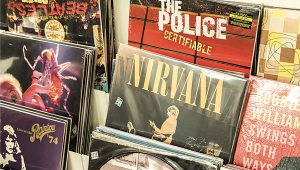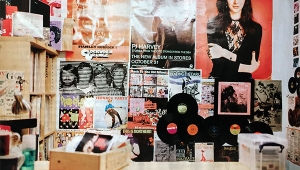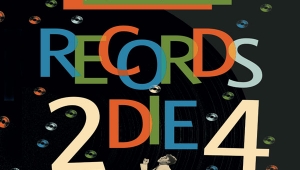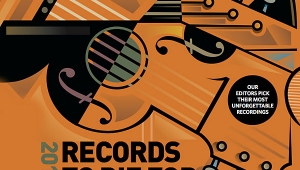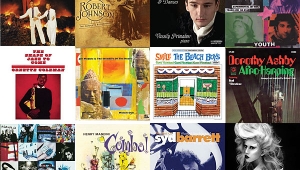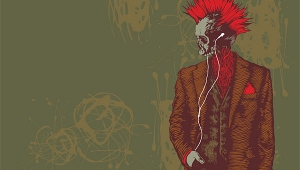| Columns Retired Columns & Blogs |
1993 Records To Die For Page 3
Robert Benson
ARNOLD: Symphonies 7 & 8
Vernon Handley, Royal Philharmonic
Conifer CDCF 177 (CD only). John Kehoe, Andrew Keener, prods.; Tryggvye Tryggvason, eng. DDD. TT: 64:36
Malcolm Arnold, best-known for his lighter works, also has a "serious" and quite sinister side, as evidenced by these world-premiere recordings of his Symphonies 7 and 8. Both are tragic, dramatic, and dissonant, often with a sense of bittersweet nostalgia. The Seventh, cryptically dedicated to the composer's three children, is perhaps his most brutal, devastating score, replete with screeching high woodwinds, sardonic brass, and smashing percussion. The Eighth is lighter, but still a somewhat surrealistic glimpse into a troubled world, its innocent, child-like Irish marching tune in the finale a welcome respite from the overall mood of despair. The Royal Philharmonic plays spectacularly under Handley's knowing direction, and the sonic quality is resplendent.
TCHAIKOVSKY: Scenes from Swan Lake
Anatole Fistoulari, Amsterdam Concertgebouw
London CS 6218 (LP). John Culshaw, prod.; Kenneth G. Wilkinson, eng. AAA.
Recorded in February 1961, immediately after Solti and the Concertgebouw recorded Mahler's Symphony 4 (London CD 417 745, see R2D4, XV-2), this is a dazzling performance, magnificently played and spectacularly engineered. First-desk players violinist Steven Staryk, cellist Tibor de Machula, and harpist Phia Berghout are given special credit for their solos; it also should have been given to the incredible timpanist for his herculean effort in the final scene. The LP has long been deleted. A Japanese CD (King K 30y 1545) is a reasonable transfer, but difficult to obtain. The London cassette (417 881-4) conveys the performance but without the sonic impact of the LP or CD.
Les Berkley
As I write this, my erstwhile listening room is piled high with boxes, and the shelves are empty. I dislike moving: it seems to be the sort of orderly cataloging of one's life that ought to be done only once; nevertheless, the consequent introspection served to remind me of...
VICTORIA: Victoria
San Francisco Records SD 206 (LP only). David Rubinson, prod.; Fred Catero, eng. AAA.
It's unfair to list this, since there probably aren't any copies out there except mine. Victoria was a gorgeous lady with an impossibly clear upper register who made two records (Secret of the Bloom in '69, and this one in '71), then dropped out of sight. (A shame she couldn't have come up these days when all you need are looks, like Debbie or Kylie or Tiffanie.) Her lyrics and melodies encapsulated the fast-fading '60s in a way that was both true to its period and timeless. The perfect 1971 folk-pop mix, pre-Aphex and other insults, showcases a voice that could go from chest to head tone in a way that would turn operatic singers green. If you happen on it, grab it, and if you find an unplayed copy, write me at Stereophile AT ONCE!
BARBARA STROZZI: Songs for Solo Voice
Glenda Simpson, soprano; The Camerata of London
Hyperion CDA 66303 (CD only). Mark Brown, prod.; Tony Faulkner, eng. DDD. TT: 52:00
I've already said what I need to about this one; the only thing further you ought to know is that I can't stop playing it! Glenda! When do we get more? (XIII-2)
Kevin Conklin
MILES DAVIS: Basic Miles: The Classic Performances of Miles Davis
Miles Davis, trumpet, fluegelhorn; various musicians
Columbia PC 32025 (LP). Teo Macero, George Avakian, prods. AAA.
It's Kind of Blue that usually appears on best-of lists, but this collection shows Miles during his best period---mid-'50s to mid-'60s---with his best groups, which feature such giants as Gil and Bill Evans, Coltrane, Cannonball Adderley, and Paul Chambers. Miles's flowing lyricism sets the tone throughout, caressing without cloying. Bill Evans's work on "Green Dolphin Street" is one of the most sublime examples of musical improvisation ever recorded, and reinforces my opinion that this tortured soul was the greatest musician ever to sit before a piano.
EDWARD PARMENTIER: Early Italian Harpsichord Music
Edward Parmentier, harpsichord
Wildboar 8001 (LP only). Peter Sutheim, eng.; Joseph Spencer, prod. AAA.
This astonishingly transparent recording was made in 1980 on lowish-tech tube gear. It was the first in what has grown into an artistically successful series of keyboard recordings produced by Early Music impresario Joseph Spencer. Despite some tube rush and analog tape hiss, it is the most convincing transcription of an instrument's timbres I know.
John Crabbe
BRUCKNER: Symphony 4 (1953 Nowak edition)
Otto Klemperer, Philharmonia Orchestra
EMI CDM 7 69127-2 (CD only). Walter Legge, prod.; Douglas Larter, eng. ADD. TT: 60:59
Taped nearly 30 years ago, this recording of Bruckner's "Romantic" symphony converted me at one hearing from indifference to enthusiasm for the simple but visionary Austrian composer. It represents Klemperer at his masterly best, supported by EMI at their best in London's Kingsway Hall. That famous venue's spacious but not overwrought ambience matches the performance perfectly, while the mighty, brazen climaxes stand forward just as they do in the concert hall, yet in rounded grandeur and without the spiky edge often heard from latterday productions. The thrill I felt in 1965 still returns whenever this CD goes on the player.
SCHUBERT: Die Schöne Müllerin
Peter Schreier, tenor; András Schiff, piano
London 430 414-2 (CD only). Christopher Raeburn, prod.; Stanley Goodall, eng. DDD. TT: 62:55
Arguably the greatest of post-Fischer-Dieskau lieder singers, Peter Schreier surely cannot help but captivate and deeply move anyone who hears his Schöne Müllerin cycle, as recorded here with pianist András Schiff. From the very first stanza of the first of these 20 songs, one is totally transported by Schubert's wonderful music into Wilhelm Müller's simple but touching poetic world, wherein Schreier takes us on the doomed young lover's introspective journey with consummately judged emotional insight. Schiff's support (on a Bösendorfer) is of matching stature, and the spacious but clear setting provided by London is exemplary. Quite superb.

ARNOLD: Symphonies 7 & 8
Vernon Handley, Royal Philharmonic
Conifer CDCF 177 (CD only). John Kehoe, Andrew Keener, prods.; Tryggvye Tryggvason, eng. DDD. TT: 64:36
Malcolm Arnold, best-known for his lighter works, also has a "serious" and quite sinister side, as evidenced by these world-premiere recordings of his Symphonies 7 and 8. Both are tragic, dramatic, and dissonant, often with a sense of bittersweet nostalgia. The Seventh, cryptically dedicated to the composer's three children, is perhaps his most brutal, devastating score, replete with screeching high woodwinds, sardonic brass, and smashing percussion. The Eighth is lighter, but still a somewhat surrealistic glimpse into a troubled world, its innocent, child-like Irish marching tune in the finale a welcome respite from the overall mood of despair. The Royal Philharmonic plays spectacularly under Handley's knowing direction, and the sonic quality is resplendent.
TCHAIKOVSKY: Scenes from Swan Lake
Anatole Fistoulari, Amsterdam Concertgebouw
London CS 6218 (LP). John Culshaw, prod.; Kenneth G. Wilkinson, eng. AAA.
Recorded in February 1961, immediately after Solti and the Concertgebouw recorded Mahler's Symphony 4 (London CD 417 745, see R2D4, XV-2), this is a dazzling performance, magnificently played and spectacularly engineered. First-desk players violinist Steven Staryk, cellist Tibor de Machula, and harpist Phia Berghout are given special credit for their solos; it also should have been given to the incredible timpanist for his herculean effort in the final scene. The LP has long been deleted. A Japanese CD (King K 30y 1545) is a reasonable transfer, but difficult to obtain. The London cassette (417 881-4) conveys the performance but without the sonic impact of the LP or CD.
Les Berkley
As I write this, my erstwhile listening room is piled high with boxes, and the shelves are empty. I dislike moving: it seems to be the sort of orderly cataloging of one's life that ought to be done only once; nevertheless, the consequent introspection served to remind me of...
VICTORIA: Victoria
San Francisco Records SD 206 (LP only). David Rubinson, prod.; Fred Catero, eng. AAA.
It's unfair to list this, since there probably aren't any copies out there except mine. Victoria was a gorgeous lady with an impossibly clear upper register who made two records (Secret of the Bloom in '69, and this one in '71), then dropped out of sight. (A shame she couldn't have come up these days when all you need are looks, like Debbie or Kylie or Tiffanie.) Her lyrics and melodies encapsulated the fast-fading '60s in a way that was both true to its period and timeless. The perfect 1971 folk-pop mix, pre-Aphex and other insults, showcases a voice that could go from chest to head tone in a way that would turn operatic singers green. If you happen on it, grab it, and if you find an unplayed copy, write me at Stereophile AT ONCE!
And for tonight's classical selection we have...
BARBARA STROZZI: Songs for Solo Voice
Glenda Simpson, soprano; The Camerata of London
Hyperion CDA 66303 (CD only). Mark Brown, prod.; Tony Faulkner, eng. DDD. TT: 52:00
I've already said what I need to about this one; the only thing further you ought to know is that I can't stop playing it! Glenda! When do we get more? (XIII-2)
Kevin Conklin
MILES DAVIS: Basic Miles: The Classic Performances of Miles Davis
Miles Davis, trumpet, fluegelhorn; various musicians
Columbia PC 32025 (LP). Teo Macero, George Avakian, prods. AAA.
It's Kind of Blue that usually appears on best-of lists, but this collection shows Miles during his best period---mid-'50s to mid-'60s---with his best groups, which feature such giants as Gil and Bill Evans, Coltrane, Cannonball Adderley, and Paul Chambers. Miles's flowing lyricism sets the tone throughout, caressing without cloying. Bill Evans's work on "Green Dolphin Street" is one of the most sublime examples of musical improvisation ever recorded, and reinforces my opinion that this tortured soul was the greatest musician ever to sit before a piano.
EDWARD PARMENTIER: Early Italian Harpsichord Music
Edward Parmentier, harpsichord
Wildboar 8001 (LP only). Peter Sutheim, eng.; Joseph Spencer, prod. AAA.
This astonishingly transparent recording was made in 1980 on lowish-tech tube gear. It was the first in what has grown into an artistically successful series of keyboard recordings produced by Early Music impresario Joseph Spencer. Despite some tube rush and analog tape hiss, it is the most convincing transcription of an instrument's timbres I know.
The Renaissance and early Baroque Italian material will be new to most listeners, and serves as a little survey of Western music in search of a tuning system. And Parmentier's playing is so intense as to be scary.
John Crabbe
BRUCKNER: Symphony 4 (1953 Nowak edition)
Otto Klemperer, Philharmonia Orchestra
EMI CDM 7 69127-2 (CD only). Walter Legge, prod.; Douglas Larter, eng. ADD. TT: 60:59
Taped nearly 30 years ago, this recording of Bruckner's "Romantic" symphony converted me at one hearing from indifference to enthusiasm for the simple but visionary Austrian composer. It represents Klemperer at his masterly best, supported by EMI at their best in London's Kingsway Hall. That famous venue's spacious but not overwrought ambience matches the performance perfectly, while the mighty, brazen climaxes stand forward just as they do in the concert hall, yet in rounded grandeur and without the spiky edge often heard from latterday productions. The thrill I felt in 1965 still returns whenever this CD goes on the player.
SCHUBERT: Die Schöne Müllerin
Peter Schreier, tenor; András Schiff, piano
London 430 414-2 (CD only). Christopher Raeburn, prod.; Stanley Goodall, eng. DDD. TT: 62:55
Arguably the greatest of post-Fischer-Dieskau lieder singers, Peter Schreier surely cannot help but captivate and deeply move anyone who hears his Schöne Müllerin cycle, as recorded here with pianist András Schiff. From the very first stanza of the first of these 20 songs, one is totally transported by Schubert's wonderful music into Wilhelm Müller's simple but touching poetic world, wherein Schreier takes us on the doomed young lover's introspective journey with consummately judged emotional insight. Schiff's support (on a Bösendorfer) is of matching stature, and the spacious but clear setting provided by London is exemplary. Quite superb.
- Log in or register to post comments



